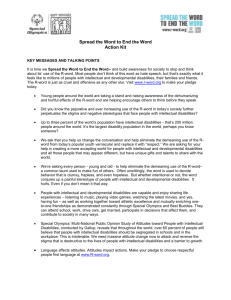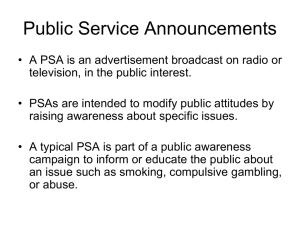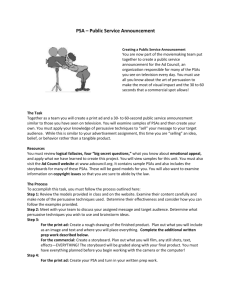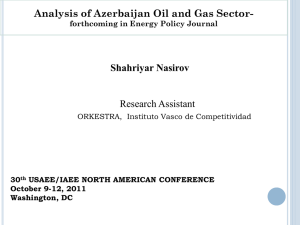2016 Gatlinburg Conference Poster PS-65
advertisement
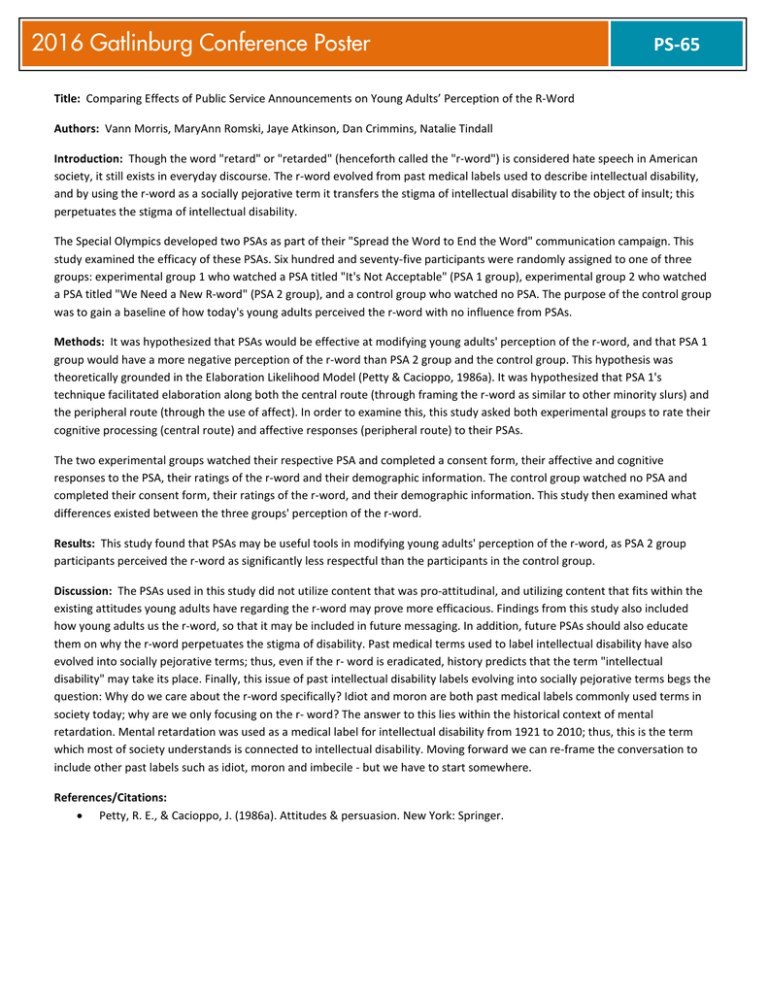
2016 Gatlinburg Conference Poster PS-65 Title: Comparing Effects of Public Service Announcements on Young Adults’ Perception of the R-Word Authors: Vann Morris, MaryAnn Romski, Jaye Atkinson, Dan Crimmins, Natalie Tindall Introduction: Though the word "retard" or "retarded" (henceforth called the "r-word") is considered hate speech in American society, it still exists in everyday discourse. The r-word evolved from past medical labels used to describe intellectual disability, and by using the r-word as a socially pejorative term it transfers the stigma of intellectual disability to the object of insult; this perpetuates the stigma of intellectual disability. The Special Olympics developed two PSAs as part of their "Spread the Word to End the Word" communication campaign. This study examined the efficacy of these PSAs. Six hundred and seventy-five participants were randomly assigned to one of three groups: experimental group 1 who watched a PSA titled "It's Not Acceptable" (PSA 1 group), experimental group 2 who watched a PSA titled "We Need a New R-word" (PSA 2 group), and a control group who watched no PSA. The purpose of the control group was to gain a baseline of how today's young adults perceived the r-word with no influence from PSAs. Methods: It was hypothesized that PSAs would be effective at modifying young adults' perception of the r-word, and that PSA 1 group would have a more negative perception of the r-word than PSA 2 group and the control group. This hypothesis was theoretically grounded in the Elaboration Likelihood Model (Petty & Cacioppo, 1986a). It was hypothesized that PSA 1's technique facilitated elaboration along both the central route (through framing the r-word as similar to other minority slurs) and the peripheral route (through the use of affect). In order to examine this, this study asked both experimental groups to rate their cognitive processing (central route) and affective responses (peripheral route) to their PSAs. The two experimental groups watched their respective PSA and completed a consent form, their affective and cognitive responses to the PSA, their ratings of the r-word and their demographic information. The control group watched no PSA and completed their consent form, their ratings of the r-word, and their demographic information. This study then examined what differences existed between the three groups' perception of the r-word. Results: This study found that PSAs may be useful tools in modifying young adults' perception of the r-word, as PSA 2 group participants perceived the r-word as significantly less respectful than the participants in the control group. Discussion: The PSAs used in this study did not utilize content that was pro-attitudinal, and utilizing content that fits within the existing attitudes young adults have regarding the r-word may prove more efficacious. Findings from this study also included how young adults us the r-word, so that it may be included in future messaging. In addition, future PSAs should also educate them on why the r-word perpetuates the stigma of disability. Past medical terms used to label intellectual disability have also evolved into socially pejorative terms; thus, even if the r- word is eradicated, history predicts that the term "intellectual disability" may take its place. Finally, this issue of past intellectual disability labels evolving into socially pejorative terms begs the question: Why do we care about the r-word specifically? Idiot and moron are both past medical labels commonly used terms in society today; why are we only focusing on the r- word? The answer to this lies within the historical context of mental retardation. Mental retardation was used as a medical label for intellectual disability from 1921 to 2010; thus, this is the term which most of society understands is connected to intellectual disability. Moving forward we can re-frame the conversation to include other past labels such as idiot, moron and imbecile - but we have to start somewhere. References/Citations: • Petty, R. E., & Cacioppo, J. (1986a). Attitudes & persuasion. New York: Springer.
